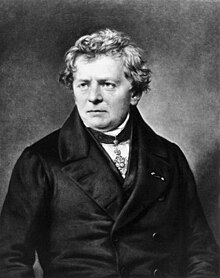
Back Georg Simon Ohm Afrikaans غيورغ زيمون أوم Arabic جورج سيمون اوم ARZ গিয়ৰ্গ ছিমন ওম Assamese Georg Simon Ohm AST Georq Om Azerbaijani قئورق زیمون اهم AZB Георг Ом Byelorussian Георг Ом BE-X-OLD Георг Ом Bulgarian
Georg Simon Ohm | |
|---|---|
 | |
| Born | 16 March 1789 |
| Died | 6 July 1854 (aged 65) |
| Nationality | German |
| Alma mater | University of Erlangen |
| Known for | Ohm's law Ohm's phase law Ohm's acoustic law |
| Awards | Copley Medal (1841) |
| Scientific career | |
| Fields | Physics (studies of electricity) |
| Institutions | University of Munich |
| Doctoral advisor | Karl Christian von Langsdorf |
Georg Simon Ohm (/oʊm/,[1] German: [ˈɡeːɔʁk ˈʔoːm];[2][3] 16 March 1789 – 6 July 1854) was a German physicist and mathematician. As a school teacher, Ohm began his research with the new electrochemical cell, invented by Italian scientist Alessandro Volta. Using equipment of his own creation, Ohm found that there is a direct proportionality between the potential difference (voltage) applied across a conductor and the resultant electric current. This relation is called Ohm's law, and the ohm, the unit of electrical resistance, is named after him.
- ^ "Ohm". Random House Webster's Unabridged Dictionary.
- ^ Dudenredaktion; Kleiner, Stefan; Knöbl, Ralf (2015) [First published 1962]. Das Aussprachewörterbuch [The Pronunciation Dictionary] (in German) (7th ed.). Berlin: Dudenverlag. pp. 398, 645. ISBN 978-3-411-04067-4.
- ^ Krech, Eva-Maria; Stock, Eberhard; Hirschfeld, Ursula; Anders, Lutz Christian (2009). Deutsches Aussprachewörterbuch [German Pronunciation Dictionary] (in German). Berlin: Walter de Gruyter. pp. 536, 788. ISBN 978-3-11-018202-6.
© MMXXIII Rich X Search. We shall prevail. All rights reserved. Rich X Search